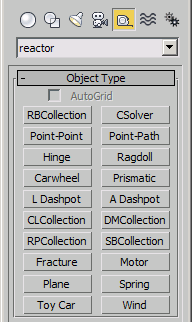Prismatic : Helper
 The Reactor dynamics system has been retired and REMOVED from 3ds Max 2012.
The Reactor dynamics system has been retired and REMOVED from 3ds Max 2012.
| Value > MAXWrapper > Node > Helper > reactor > Prismatic |
APrismatic Constraint is a constraint between two rigid bodies, or a rigid body and the world, that allows its bodies to move relative to each other along one axis only. Rotations as well as the remaining two translation axes are fixed.
When set to true , the Parent Body will be used in the simulation.
When set to true , the constraint will be breakable. If its breakable limits are exceeded during simulation it will cease to exert impulses on the attached objects.
Get/Set the linear breaking limit value used to when .isBreakable is set to true .
The angular breaking limit value used to when .isBreakable is set to true .
When set to true , the simulation will respect the limits.
Get/Set the minimum distance the constraint will allow between the two prismatic spaces.
Get/Set the maximum distance the constraint will allow between the two prismatic spaces.
Get/Set the amount of friction applied to the objects as they try to move along the prismatic axis. It is only applied to limited hinges
These two properties govern the impulses applied to the constraint's bodies in order to maintain the constraint, and so how strongly the constraint works to restrict their movement.
When set to true , the relative transform between the child and parent constraint spaces is locked - if you move the child space in the viewport, the parent space will move with it, and vice versa.
Interfaces
When set to true , the Parent Body will be used in the simulation.
Get/Set the Parent Body's transformation matrix.
Get/Set the Child Body's transformation matrix.
When set to true , the relative transform between the child and parent constraint spaces is locked - if you move the child space in the viewport, the parent space will move with it, and vice versa.
These two properties govern the impulses applied to the constraint's bodies in order to maintain the constraint, and so how strongly the constraint works to restrict their movement.
When set to true , the constraint will be breakable. If its breakable limits are exceeded during simulation it will cease to exert impulses on the attached objects.
Get/Set the linear breaking limit value used to when .isBreakable is set to true .
The angular breaking limit value used to when .isBreakable is set to true .
When set to true , the simulation will respect the limits.
Get/Set the amount of friction applied to the objects as they try to move along the prismatic axis. It is only applied to limited hinges
Get/Set the minimum distance the constraint will allow between the two prismatic spaces.
Get/Set the maximum distance the constraint will allow between the two prismatic spaces.
Aligns the Constraint to the Parent Body.
Aligns the Constraint to the Child Body.
Aligns the Constraint to parent space.
Aligns the Constraint to child space.
Aligns the Constraint to both bodies.
Returns true if the Prismatic Constraint is valid, false otherwise. A valid Prismatic Constraint has the correct number of rigid bodies attached and is included in a valid constraint solver.

